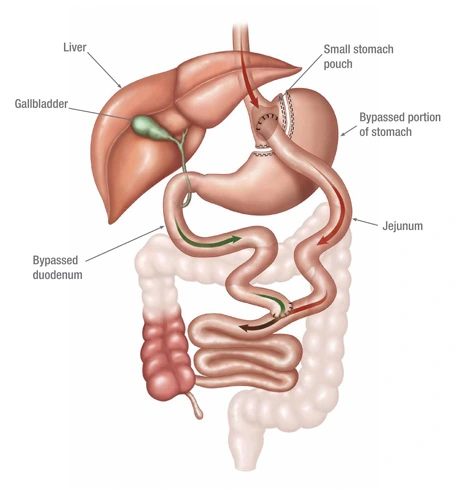Gastric Bypass
Gastric bypass has been one of the most commonly performed weight loss procedures for the last several decades.
Gastric Bypass
Gastric bypass has been one of the most commonly performed weight loss procedures for the last several decades.

What is Gastric Bypass?
Gastric bypass surgery, also known as roux-en Y gastric bypass, is a laparoscopic procedure to restrict the amount of food a patient can consume. Gastric bypass involves the creation of a small gastric pouch then connecting that pouch to the small intestine,
Trusted Source
Gastric Bypass
Mayo Clinic
Go to Source
rerouting digestion
to bypass much of the stomach and part of the small intestine.
Patients who undergo gastric bypass lose weight due to the resizing of the stomach and the rerouting of the digestive tract. This procedure is both restrictive and changes hunger hormones, meaning that it both restricts the amount of food which can be consumed and decreases hunger. As a result, dramatic weight loss and improved health can be expected.*
Benefits of Gastric Bypass
Gastric bypass surgery has many advantages:
Weight Loss
Patients who have gastric bypass surgery can experience
Trusted Source
Bariatric surgery: a systematic review and meta-analysis
Buchwald H, Avidor Y, Braunwald E, Jensen MD, Pories W, Fahrbach K, Schoelles K
Go to Source
significant weight loss
in a short amount of time.*
Reduction in Cravings
Gastric bypass patients may experience a
Trusted Source
Laparoscopic sleeve gastrectomy: More than a restrictive bariatric surgery procedure?
Benaiges D, Más-Lorenzo A, Goday A, Ramon JM, Chillarón JJ, Pedro-Botet J, Flores-Le Roux JA
Go to Source
reduction of ghrelin
, a hormone that helps regulate cravings, hunger, and blood sugar.*
Cure Sleep Apnea
Trusted Source
Obstructive sleep apnea: the effect of bariatric surgery after 12 months
Peromaa-Haavisto P, Tuomilehto H, Kössi J, Virtanen J, Luostarinen M, Pihlajamäki J, Käkelä P, Victorzon M
Go to Source
78% of patients
are cured of sleep apnea after gastric bypass surgery.*
Remission or Improvement of Type 2 Diabetes
Improvement or total remission of type 2 diabetes has been
Trusted Source
Remission of type 2 diabetes after gastric bypass and banding: mechanisms and 2 year outcomes
Pournaras DJ, Osborne A, Hawkins SC, Vincent RP, Mahon D, Ewings P, Ghatei MA, Bloom SR, Welbourn R, le Roux CW
Go to Source
noted in 72%
of gastric bypass patients.*
Remission of High Blood Pressure
Trusted Source
Effects of Bariatric Surgery in Obese Patients With Hypertension: The GATEWAY Randomized Trial (Gastric Bypass to Treat Obese Patients With Steady Hypertension)
Schiavon CA, Bersch-Ferreira AC, Santucci EV, et al
Go to Source
51% of patients
show remission of high blood pressure (hypertension) after gastric bypass surgery.*
Faster Recovery
Because gastric bypass surgery is performed laparoscopically, patients experience shorter hospital stays, smaller scars, and a faster recovery than with open surgery.*
Improved Quality of Life
After gastric bypass surgery, the overwhelming majority of patients report a
Trusted Source
Quality of Life After Bariatric Surgery
Major P, Matłok M, Pędziwiatr M, et al
Go to Source
significant improvement
in overall quality of life.*

Preparing for Gastric Bypass
When patients partner with Alabama Surgical Associates, we work with them extensively as they prepare for gastric bypass surgery. Patients undergo a thorough medical evaluation to determine that they are a good candidate for bariatric surgery. We also make sure patients are educated about all aspects of the gastric bypass procedure, recovery period, and ongoing journey to a healthier lifestyle. By the time their surgery is scheduled, patients have learned about healthy eating, exercise, and emotional factors that may contribute to their obesity. They will also have built relationships with multiple members of our care team, so patients have a strong support network to rely on throughout their bariatric surgery experience.

The Gastric Bypass Procedure
Gastric bypass changes the anatomy of the gastrointestinal tract by reducing the size of the stomach and altering the path food takes. Our doctor uses a laparoscopic technique, which is a less invasive method with fewer scars, a shorter hospital stay, and quicker recovery times. Surgery is performed with the patient under anesthesia.
During the procedure, Dr. Doucette will divide the stomach into an upper and lower portion. This will create a smaller upper stomach (pouch), and bypass the lower stomach and the beginning of the intestine. The smaller upper part of the stomach is then connected to the middle of the small intestine. The lower stomach and the beginning of the intestine is then reconnected further down to the intestine. The stomach is left smaller and the digestive tract shorter. As a result, after surgery, patients will feel full faster because there is less room for food and have less hunger as a result of the changes in hunger hormones.

Recovery After Gastric Bypass Surgery
Since we take a laparoscopic approach, our patients will have a shorter hospital stay and quicker recovery. Most patients can resume regular activities within a week after surgery. After surgery, our doctors and team monitor recovery through a number of check up appointments. Our team also provides support for the dietary and lifestyle changes that must accompany weight loss surgery.
In order to support patient’s long term success, our practice offers a comprehensive post-op weight loss program. Resources at Alabama Surgical Associates include long-term follow up care and licensed dietitians experienced in weight loss nutrition to guide patients through the nutritional changes after gastric bypass.
Gastric Bypass Results
Following gastric bypass surgery, patients lose an
Trusted Source
Bariatric Surgery: A Systematic Review and Meta-analysis
Buchwald H, Avidor Y, Braunwald E, et al
Go to Source
average of 70%
of their excess body weight. This, in turn, leads to an improvement in or remission of type 2 diabetes, resolved sleep apnea, resolution of high blood pressure, and reduction of other obesity comorbidities.*
*Results may vary
Who is a Candidate for Gastric Bypass?
The best way to determine whether you are a candidate for gastric bypass surgery is to schedule a consultation with our weight loss surgeon. In general, candidates for gastric bypass have a body mass index (BMI) of over 40, or a BMI of 35 with medical issues related to their weight.

You Can Afford this Life Changing Procedure!
Inclusive Self-Pay Package $11,995
$286*
PER MONTH
*estimated monthly payment for those who qualify
Gastric Bypass costs include:
- Surgeon’s professional fees
- Anesthesia
- Facility fees
- Overnight hospital stay
Invasiveness
Excess Weight Loss*
Rate of Weight Loss*
Average Procedure Time
Typical Hospital Stay*
Insurance Coverage Available*
Financing Available
Self Pay Cost
Gastric Balloon
Invasiveness
Excess Weight Loss*
Rate of Weight Loss*
Average Procedure Time
Typical Hospital Stay*
Insurance Coverage Available*
Financing Available
Self Pay Cost
Non-Invasive
20-40lbs
Slow
Less than 30 minutes
Out-patient
No
Yes
$5,995
ESG
Invasiveness
Excess Weight Loss*
Rate of Weight Loss*
Average Procedure Time
Typical Hospital Stay*
Insurance Coverage Available*
Financing Available
Self Pay Cost
Non-Invasive
40%
Slower
Less than 1 hour
Out-patient
Yes
Yes
$8,995
Gastric Banding
Invasiveness
Excess Weight Loss*
Rate of Weight Loss*
Average Procedure Time
Typical Hospital Stay*
Insurance Coverage Available*
Financing Available
Self Pay Cost
Minimal
40%
Slower
Less than 1 hour
Out-patient
Yes
Yes
$8,995
Gastric Sleeve
Invasiveness
Excess Weight Loss*
Rate of Weight Loss*
Average Procedure Time
Typical Hospital Stay*
Insurance Coverage Available*
Financing Available
Self Pay Cost
Minimal
40%
Slower
Less than 1 hour
Out-patient
Yes
Yes
$9,995
Gastric Bypass
Invasiveness
Excess Weight Loss*
Rate of Weight Loss*
Average Procedure Time
Typical Hospital Stay*
Insurance Coverage Available*
Financing Available
Self Pay Cost
Minimal
40%
Slower
Less than 2 hours
Out-patient
Yes
Yes
$11,995
DS/SADI-S
Invasiveness
Excess Weight Loss*
Rate of Weight Loss*
Average Procedure Time
Typical Hospital Stay*
Insurance Coverage Available*
Financing Available
Self Pay Cost
Minimal
40%
Slower
Less than 1 hour
Out-patient
Yes
Yes
*Call for Pricing
Frequently Asked Questions About Gastric Bypass
How much does gastric bypass surgery cost?
At Alabama Surgical Associates, we realize that for many of our patients, gastric bypass is a life-saving procedure. To ensure that better health is within everyone’s reach, we offer highly competitive self-pay pricing for patients whose procedure is not covered by insurance or who wish to streamline the weight loss surgery process by self-paying. Learn more about the cost of gastric bypass surgery, and get information on payment options we offer our patients.
Will insurance cover my gastric bypass?
For many patients, bariatric surgery is considered a medical necessity and is thus covered by medical insurance. We provide a free insurance check so that you can determine whether your plan covers weight loss surgery.
What are the risks of gastric bypass surgery?
Any surgical procedure is associated with potential risks and complications, but working with an experienced surgeon, like the surgeon at Alabama Surgical Associates, is the best way for patients to feel confident in the outcome of their procedure. Risks of gastric bypass surgery include:
- Infection
- Bleeding
- Blood clots
- Hernia
- Respiratory problems
- Leaking of the gastrointestinal system
-
Trusted Source Gastric Bypass Mayo Clinic Go to Source Bowel obstruction
Step into Wellness: Your Path to a
Lighter, Brighter Future Starts Now
Connect with Alabama Surgical Associates to take a proactive step towards your weight loss
goals. With our expert team and comprehensive approach, you’ll find the guidance and
support you need to achieve lasting results and improved well-being.
Dr. Darrell Doucette has either authored or reviewed and approved this content.
Page Updated:
1 Mayo Clinic. Gastric Bypass. Available: https://www.mayoclinic.org/tests-procedures/gastric-bypass-surgery/about/pac-20385189. Accessed March 16, 2022.
2 Buchwald H, Avidor Y, Braunwald E, Jensen MD, Pories W, Fahrbach K, Schoelles K. Bariatric surgery: a systematic review and meta-analysis. JAMA. 2004 Oct 13;292(14):1724-37. doi: 10.1001/jama.292.14.1724. Erratum in: JAMA. 2005 Apr 13;293(14):1728. PMID: 15479938. Available: https://pubmed.ncbi.nlm.nih.gov/15479938/. Accessed March 16. 2022.
3 Benaiges D, Más-Lorenzo A, Goday A, Ramon JM, Chillarón JJ, Pedro-Botet J, Flores-Le Roux JA. Laparoscopic sleeve gastrectomy: More than a restrictive bariatric surgery procedure? World J Gastroenterol. 2015 Nov 7;21(41):11804-14. doi: 10.3748/wjg.v21.i41.11804. PMID: 26557004; PMCID: PMC4631978. Available: https://pubmed.ncbi.nlm.nih.gov/26557004/. Accessed March 16, 2022.
4 Peromaa-Haavisto P, Tuomilehto H, Kössi J, Virtanen J, Luostarinen M, Pihlajamäki J, Käkelä P, Victorzon M. Obstructive sleep apnea: the effect of bariatric surgery after 12 months. A prospective multicenter trial. Sleep Med. 2017 Jul;35:85-90. doi: 10.1016/j.sleep.2016.12.017. Epub 2017 Jan 12. PMID: 28549834. Available: https://pubmed.ncbi.nlm.nih.gov/28549834/. Accessed March 16, 2022.
5 Pournaras DJ, Osborne A, Hawkins SC, Vincent RP, Mahon D, Ewings P, Ghatei MA, Bloom SR, Welbourn R, le Roux CW. Remission of type 2 diabetes after gastric bypass and banding: mechanisms and 2 year outcomes. Ann Surg. 2010 Dec;252(6):966-71. doi: 10.1097/SLA.0b013e3181efc49a. PMID: 21107106. Available: https://pubmed.ncbi.nlm.nih.gov/21107106/. Accessed March 16, 2022.
6 Schiavon CA, Bersch-Ferreira AC, Santucci EV, et al. Effects of Bariatric Surgery in Obese Patients With Hypertension: The GATEWAY Randomized Trial (Gastric Bypass to Treat Obese Patients With Steady Hypertension) [published correction appears in Circulation. 2019 Oct;140(14):e718]. Circulation. 2018;137(11):1132-1142. doi:10.1161/CIRCULATIONAHA.117.032130. Available: https://www.ncbi.nlm.nih.gov/pmc/articles/PMC5865494/. Accessed March 16, 2022.
7 Major P, Matłok M, Pędziwiatr M, et al. Quality of Life After Bariatric Surgery. Obes Surg. 2015;25(9):1703-1710. doi:10.1007/s11695-015-1601-2. Available: https://www.ncbi.nlm.nih.gov/pmc/articles/PMC4522031/#:~:text=In%20as%20many%20as%2070.6,corresponding%20to%20the%20general%20standard. Accessed March 16, 2022.
8 Buchwald H, Avidor Y, Braunwald E, et al. Bariatric Surgery: A Systematic Review and Meta-analysis. JAMA. 2004;292(14):1724–1737. doi:10.1001/jama.292.14.1724. Available: https://jamanetwork.com/journals/jama/article-abstract/199587. Accessed March 16, 2022.
9 Mayo Clinic. Gastric Bypass. Available: https://www.mayoclinic.org/tests-procedures/gastric-bypass-surgery/about/pac-20385189. Accessed March 16, 2022.